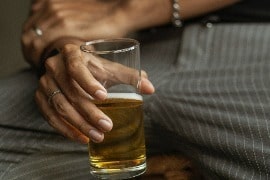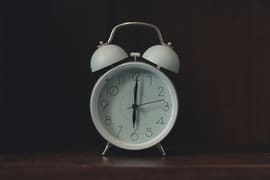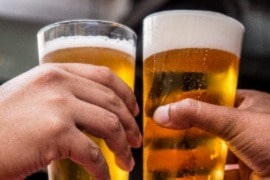Drinking alcohol can cause hair loss for several different reasons.
Article at a Glance:
Yes, alcohol can cause hair loss. Alcohol and hair loss are related because of:
Poor nutrition from the unbalanced diet that alcoholism causes
Changes in blood sugar that are caused by alcohol use
Poor sleep caused by alcohol use
Changes in estrogen levels that alcoholism can cause
Alcohol and Hair Loss
Alcohol can cause hair loss for several reasons related to how alcohol affects the body in general. Excessive alcohol use and alcohol addiction can wreak havoc on your life and your health, and can even affect your appearance.
One such side effect is the connection between alcohol and hair loss. Many people wonder if alcohol use can lead to hair loss, and if so, how can drinking too much alcohol leads to such an unexpected side effect.
What to Know About Alcohol-Related Hair Loss
No part of your body, health or life goes untouched by the effects of excessive alcohol use, and even your hair can be impacted.
Alcohol Use Can Lead to Malnutrition
Why does alcohol cause hair loss? The relationship between alcohol and hair loss is complex, but two of the biggest reasons why alcoholics and heavy drinkers experience hair loss include:
- Poor nutrition, or not eating the right nutrients
- Inability to absorb the proper nutrients because of alcohol consumption
When you drink excessively, you consume empty calories with no nutritional benefits, which is especially true if you primarily drink beer or liquor. As you consume so many of your calories in the form of alcohol, you’re probably not focusing on maintaining a nutritious, well-balanced diet in the process.
You may even feel full most of the time when you’re drinking heavily, simply because you’re drinking so much alcohol, which can lead to malnutrition. That malnutrition can lead to scary side effects, including brain damage from a lack of thiamine, and hair loss. The right amount of vitamins, minerals, proteins, fats, and carbohydrates are essential to a healthy scalp and head of hair.
However, it’s not just a lack of nutrients or a poor diet that connect alcohol and hair loss. Alcohol can also cause hair loss by interfering with the absorption of essential vitamins and nutrients. Drinking can destroy the lining of the stomach and increase acid production in the digestive system, which makes it difficult for your body to absorb nutrients properly.
Drinking excessively also has a diuretic effect that can lead to lower levels of potassium and magnesium in the body. When this happens, it makes it more difficult for your body to sustain typical, healthy functions, including hair growth.
Other Ways Alcohol and Hair Loss Are Linked
While nutrition plays a significant role in alcohol-related hair loss, there are also other ways alcohol and hair loss are linked to one another.
Some of the other ways alcohol and hair loss are related include:
- Drinking alcohol dehydrates you: Heavy alcohol use can lead to damage to the health of your hair. When you’re dehydrated, it can make existing hair follicles very dry and brittle, which makes them more likely to fall out. Dehydration can also cause dandruff.
- Using alcohol causes blood sugar spikes: These spikes in blood sugar have been linked to pattern baldness.
- Alcohol use disrupts your sleep: When you drink excessively you may sleep, but it’s usually not high-quality sleep. When you don’t sleep enough (or sleep well), it can increase stress, and stress is linked to hair loss. The condition called telogen effluvium, or TE, refers to stress-induced hair loss. When this happens, your hair follicles don’t replenish themselves as they should, but they continue shedding.
- Alcohol use changes estrogen levels: Alcohol use has been shown in research to be connected to increased levels of estrogen. Increased estrogen, particularly in men, can cause problems with hair growth and loss.
Related Topic: Does alcohol raise blood sugar
How to Avoid Hair Loss From Alcohol
Hair loss from excessive alcohol consumption is just one of the more visible side effects of all the damage happening in your body. If you’re worried about alcohol and hair loss, you can:
- Cut down on your drinking
- Eat a balanced diet
- Take nutritional supplements for necessary vitamins and minerals
- Stop drinking altogether
Reversing Alcohol-Related Hair Loss
Hair loss that is influenced by alcohol-related nutrient deficiency can be upsetting, but the good news is that it is reversible. By quitting alcohol entirely and eating nutritiously, your body will get the nutrients that it needs for normal hair growth and be able to absorb these nutrients more efficiently. While restoring deficient nutrients can help to improve hair health, it may take several months for nutrients to reach a healthy level and for hair growth to occur.
If you struggle to control your drinking, a treatment center like The Recovery Village can help you overcome your addiction and connect you to the care you need. Call The Recovery Village to learn more about your options for alcohol detox and alcohol rehab treatment.
Articles Related to Alcoholism

Alcohol detox isn’t easy and not everyone can do it on their own. That is why alcohol detox and alcohol withdrawal treatment is administered by medical professionals.

Alcoholism takes many forms, and the stereotype doesn’t always hold true. So when do a few drinks with friends become a full-blown alcohol addiction? How do you know if you are an alcoholic?

While cirrhosis scars from excessive drinking are irreversible, quitting alcohol and leading a healthier lifestyle can help your liver heal from alcohol-related liver disease.

When detoxing, hydration is key. However, certain food groups also have benefits when it comes to helping with the discomfort of withdrawal symptoms and detoxification.

Detox from alcohol can begin within hours. Typically, alcohol withdrawal symptoms happen for heavier drinkers. Alcohol withdrawal can begin within hours of ending a drinking session.

Daily drinking can have serious consequences for a person’s health, both in the short- and long-term. Many of the effects of drinking every day can be reversed through early intervention.


Goldburg, Lynne J. & Lenzy, Yolanda. “Nutrition and Hair.” Clinics in Dematology. August 2010. Accessed March 26, 2019.
World, M. J., Ryle, P. R., Thomson, A. D. “Alcoholic Malnutrition and the Small Intestine.” Alcohol and Alcoholism. 1985. Accessed March 26, 2019.
Epstein, Murray. “Alcohol’s Impact on Kidney Function.” Alcohol Health and Research World. 1997. Accessed March 26, 2019.
Purohit, V. “Moderate alcohol consumption and estroge[…]usal women: a review.” Alcoholism: Clinical and Experimental Research. August 1998. Accessed March 26, 2019.
The Recovery Village aims to improve the quality of life for people struggling with substance use or mental health disorder with fact-based content about the nature of behavioral health conditions, treatment options and their related outcomes. We publish material that is researched, cited, edited and reviewed by licensed medical professionals. The information we provide is not intended to be a substitute for professional medical advice, diagnosis or treatment. It should not be used in place of the advice of your physician or other qualified healthcare providers.